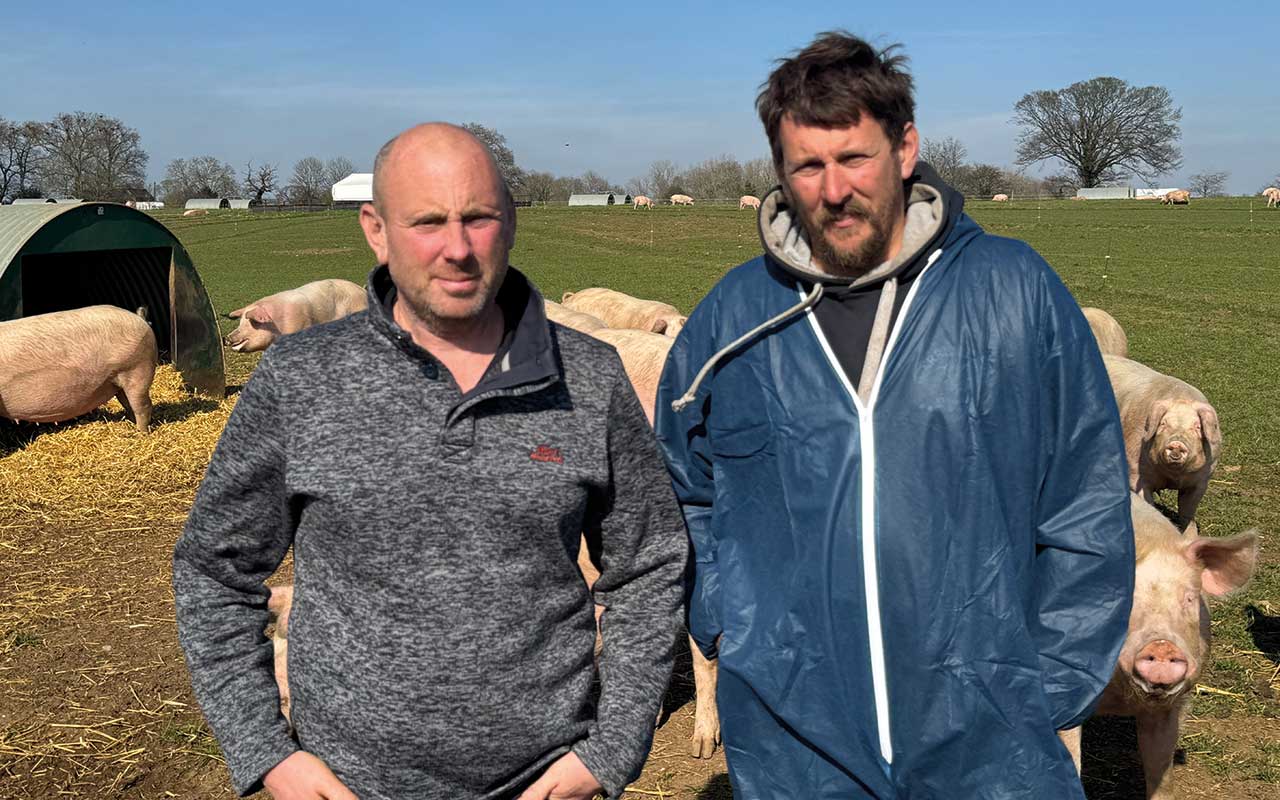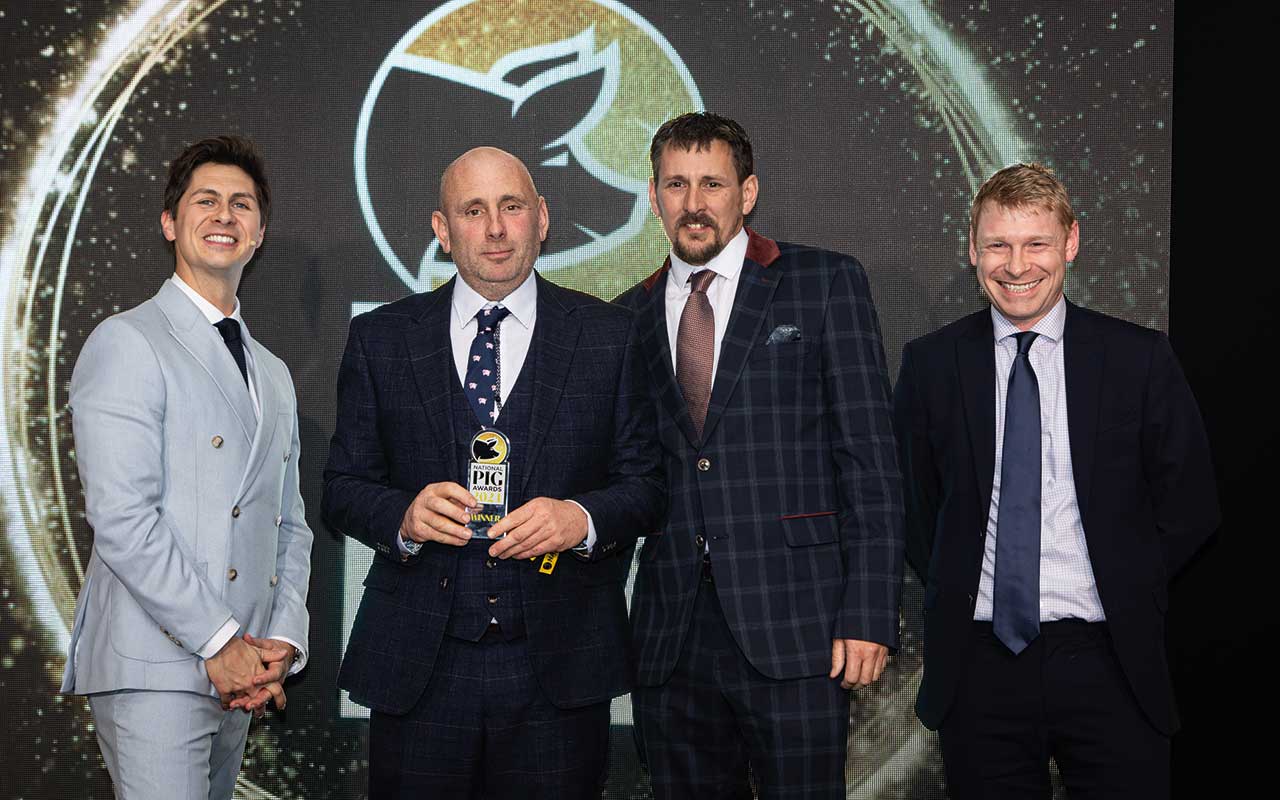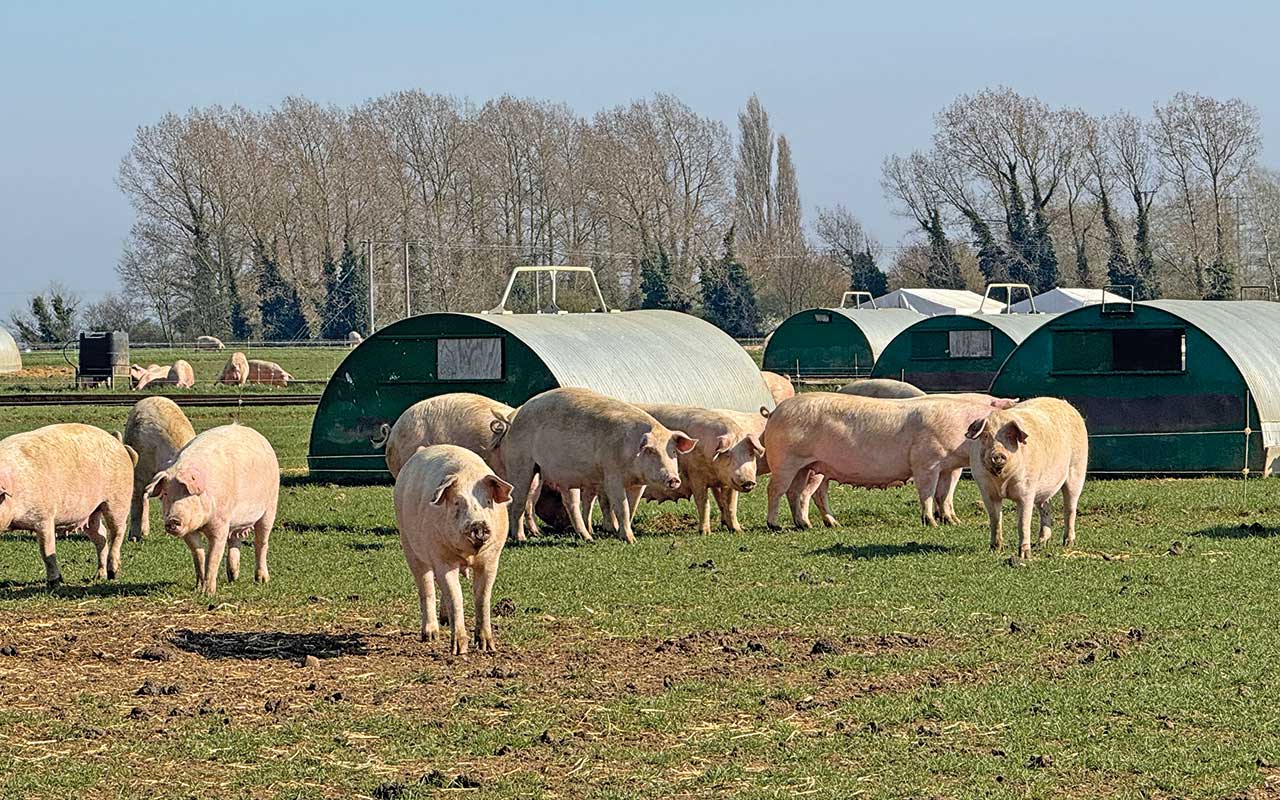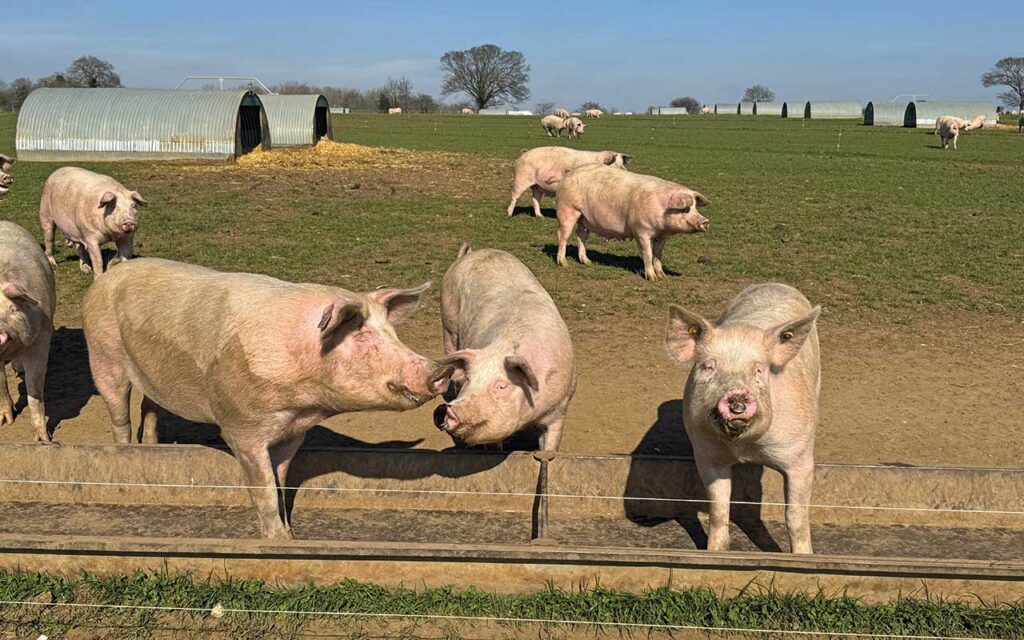The 2024 Outdoor Pig Producer of the Year – an award built, as always, on a strong team – is not standing still. The multiple-award-winning business is undergoing a big move of one of its units and, despite the many challenges the industry faces, it sees a bright future in outdoor pig production and is looking to grow further.
R&C Mellor won the award for the second time last year, having also picked up the Outdoor and Overall awards in 2017. The unit is also a two-time winner of the Herd Productivity award.
Richard and Charlotte Mellor run Grange Farm, with 1,250 single-parity sows, and Warren Farm, a 1,250-sow unit with in-farm multiplication, both near King’s Lynn in Norfolk.
Richard runs the Grange Farm herd for two-and-a-half years, until the sows have had six litters – and it is then depopulated and a new herd comes in. Warren Farm is a more conventional unit that includes purebred Landrace, so it is able to produce its own replacements.
Otherwise, both units are very similar in what they’re doing – producing five-week-old weaners that go to one of BQP’s finishing farms, weighing between 9kg and 9.5kg.

On the move
Among the many challenges facing outdoor producers is finding land. “We’re lucky at Grange Farm, as it’s a council farm, so I’ve got a long-term tenancy here, and we’re on 350 acres,” Richard said.
“We’re in charge of the whole farm, whereas at Warren Farm, at any one time, we’re on 110 acres of rented land on an arable estate.”
Unfortunately, the new owners of the arable estate don’t want a pig unit. “They’re trying to get planning permission to put solar panels on the land the pigs are on at the minute,” Richard explained.
“We’ve had to find some land, which is really difficult, but luckily the farm I was on before I got this tenancy was happy for us to go back on there with the pigs.”
Lee Hewitt, the manager of Warren Farm, which he runs with his four sons, is undertaking the mammoth task of moving 1,250 sows less than a mile down the road.
“He’s got to dismantle all the fences, pick up all the huts and move all the sows to a different farm,” Richard said.
“He started building the paddocks in April. July 1 is the date we actually have to be off the yard, but we’re hoping to have the pigs off by the start of June, which would give us two or three weeks to make sure everything is cleared and tidy.
“We’ve had a year’s notice, but it was hard finding the land because there’s so much uncertainty in farming. Arable farmers have been able to earn just as much in some of the environmental schemes as they can by renting 100 acres to us.
“Do they want the hassle of 1,250 sows on their land, or do they want to just put a bit of herbal ley in and get paid for that for two years?
“We’ve got a good reputation – our units always look good and are well run, but it’s hard trying to persuade people in the current climate.”
Once moved, the units will be about two-and-a-half miles apart. “BQP would, ideally, like all its units to be two miles apart, but that is just so difficult around this area because pigs tend to be on the lightest land areas,” Richard said.
“You’ll get some units, not necessarily from the same companies, that are only a field apart, which is not ideal for biosecurity and health management.
“For the benefit of both our units, we are as close as we want to be.”
Latest production figures |
||
| Single-parity farm | Conventional farm | |
| Farrowing | 94% | 90.2% |
| Born alive | 13.2 | 13.7 |
| Pre-weaning mortality | 7.4 | 7.4 |
| Weaned/litter | 12.2 | 12.2 |
| Pigs/sow/year | 28 | 27.5 |
| Piglet weight | 9.4kg | 9.4kg |
The team
Another challenge, in common with many pig business across the country, is getting decent staff. The business employs 12 people, including Richard and Charlotte’s daughter, Chloe, who has just come back from maternity leave, and is doing a couple of days a week.
Richard said: “In the wider industry, staff recruitment is a big issue. But our conventional unit is staffed by Lee and his four capable sons, and we’re lucky enough to have some good, young and keen staff.”
Lee had worked for Richard for a couple of years when he first started, but left to manage another unit because Richard couldn’t offer him that opportunity at the time. “Lee was the only person I’d ever considered to run the second unit if we were lucky enough to do it,” Richard said.
“Once I knew him and his lads were on board, we were lucky that a chap who had two units wanted to sell one, so we bought that. It wasn’t all plain sailing, as that herd wasn’t in the greatest health, so we had to depop it and start again. However, it has gone from strength to strength.
“We’ve got a job open at the minute here at Grange Farm – Chloe’s not really going to be coming back more than a couple of days a week. We’ve had several people apply for it, but a lot of inexperienced people, or some frequent flyers; several applicants have worked on nearly every pig unit in the area.
“As an industry, you’re always looking for staff, so these people will always get a job, because there’s always somebody out there who needs a hand. But it’s hard finding people who understand it’s not a 9-5 job.”

Sow comes first
“The important thing in rearing pigs is that the sow comes first,” Richard said. “If she’s happy and well looked after, hopefully she’s going to produce a lot of piglets. Animal welfare is paramount, but we are a business, and they’ve got to produce,” he said.
“Outdoors, they’re able to behave as naturally as possible. I’ve worked indoors, and there’s nothing wrong with a well-run indoor pig unit, but in my mind, a pig is the last animal that enjoys being contained in a small area – they like freedom and pigs are a group animal.”
Sows are only placed in individual paddocks when they farrow, but there’s only a single wire that splits them, so they can ‘talk’ to each other and virtually lay next to each other. “They’re very sociable animals,” Richard added.
While outdoor pig farming can be a joy when the weather is right, he acknowledged that it can be harder for outdoor units, especially in the winter.
“A pig’s foot doesn’t rot, unlike sheep, so they can be stood in water for six months of the year. As long as they’ve got somewhere nice, dry and warm to lay that is well strawed, with food and water, the pigs thrive,” he said.
“They probably hate the real hard, frosty weather more than the wet, because it’s uncomfortable on their feet. Everything is aimed at trying to make them as comfortable and well-looked after as possible, which in turn makes us a decent living.”

Disease threat
Potentially the biggest threat facing farmers is disease, particularly given what is circulating in Europe.
“Foot-and-mouth disease has returned in Europe and African swine fever [ASF] is rife, and has been for a long time,” Richard said.
“As a little island, we ought to be able to keep these sorts of things out, but our border controls aren’t the best. I’ve spoken to a prominent vet, who thinks ASF is probably in the UK on infected meat that has been brought in illegally. We have to make sure it doesn’t come onto a unit.
“Although it’s very infectious, they do say that with good biosecurity, you can keep ASF out of your unit. Obviously, indoor units stand a far better chance of keeping it away than outdoor units, but the main thing we need to focus on is the perimeter fence to keep wild animals out, especially if there are feral pigs around.
“We should have very good border controls with everything being checked, so that if it’s not right, it doesn’t come in. The government needs to be doing a lot more to stop these dodgy meats coming into the country.
“We seem to be heavily checked on anything leaving our shores going the other way, but we appear to be quite open to goods coming in this way.”
Richard is also adamant that any pork imports coming into the country, including via legitimate routes, should match our standards.
“People need choice – in some cases, they either can’t afford to eat high-welfare pork or don’t want to, but anything that comes into this country should be up to our welfare standards, at least – it shouldn’t be negotiable.
“If it doesn’t meet our welfare standards, it shouldn’t be allowed in the country, but if it ticks all the boxes, then it can come in, and people can have a choice.
“We’ve got one arm tied behind our backs all the time, because we are – rightly so – meeting these standards, and it shouldn’t be any less for imported products than what we’re doing.
“Why do they then let all this other cheap, inferior stuff into the country? We’re battling against that all the time – it just needs to be a level playing field.”
Award-winning business
Richard said it was ‘fantastic’ to win the award. “It’s my second Outdoor Producer award, but it’s the first since we’ve had the second unit.
“When we first won it, it was only Chloe and I that went, so it was really nice this time to have the whole team there, as it is a whole team effort – it just shows all the hard work that everybody puts in. There were 20 of us there last year and the year before; it’s a good way of saying ‘thank you’ for all the hard work.
“While it’s mine and my wife’s name on the sign at the end of the drive, we can’t do anything without decent people. BQP asked us for a long time to do a second unit, but we said we’d only do it if we could find the right people.”
Looking ahead, Richard ‘wouldn’t say no’ to a third unit. “We’ve got enough young staff, especially at Warren Farm. Dylan, Lee’s eldest, is the assistant manager, and in a couple of years, he’ll probably start looking at running his own unit,” he said.
“I’d rather keep the good people within the business than lose them. I haven’t got the time to be chasing people about – we want the job done the right way.”




